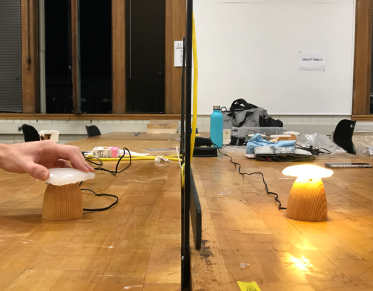Anonymous Intimacy
F21 - Team: Juhi Dhanesha, Tom Scherlis, Patricia Yu, Sam Zeloof
Fall 2021 Professor Sinan Goral, Spring 2022 Research Advisor Simon Cullen
What would anonymous communication be?
In a world where people constantly seek interaction and validation, interactions are often ironically less intimate between those who try to connect. Actions can become less meaningful and more performative, like a Facebook birthday notification. To challenge this shift in social interaction, NEXUM is a lamp-like device that provides a network to connect users anonymously, and prohibits users from curating the way that their message can be interpreted, and who will receive it.
With Nexum, people are compelled to see intimacy with a new lens. One can send a pulse into the network, know that the pulse will reach a random someone else, but they cannot change or control the pulse that they are sending. The duration and color of the pulse are standard across all devices, and the receiver is randomized. This stripped down version of connection removes the performative nature of modern connection and simplifies the interaction into a bare state.
When users notice a little glow in the corner of their eye, they will know that someone else is out there, reaching out in hope that someone will see it. Maybe they missed it because they were asleep or maybe it’s exactly what they needed to take a moment out of their day to remember others and the strength of connection and intimacy.
If someone sends pulses out often but has never received one back, it could be disheartening. However, hope for a response and self projection can help one develop patience for others in daily life. This design hopes to generate and explore the extreme of self projection, of self soothing and related topics and to see if a basic, black box interaction can lead to a sense of group identity.
HYPOTHESES (independent capstone research)
H1: Does this level of minimal interaction help those who are socially isolated build confidence for future interactions?
H2: Does this design lead others to have more empathy for strangers?
H3: Can the mere knowledge that others are out there help lonely people self-soothe?






